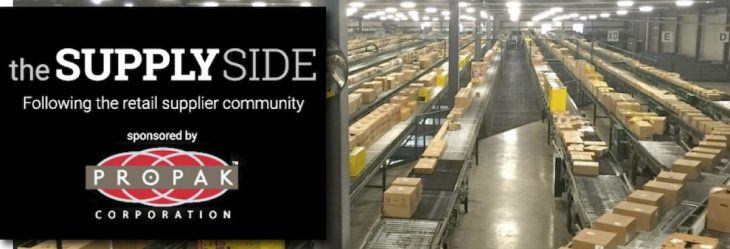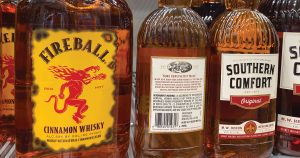The Supply Side: Sazerac helped during wars, prohibition, now COVID-19
by September 19, 2020 9:48 am 1,368 views

Stepping up in times of need is nothing new for Walmart alcohol supplier Sazerac, which for more than 150 years has worked to raise American spirits. CEO Mark Brown said when COVID-19 hit the U.S., the company knew it needed to help.
“It’s very much in our corporate nature to help, and we knew we had the manufacturing footprint to start making hand sanitizer on an industrial scale immediately. While many people helped out on a small scale, we could do it at scale. It seemed like a very natural thing for us to start doing,” Brown said in a recent video interview with Walmart U.S. CEO John Furner.
Brown told the Northwest Arkansas Business Journal all five of Sazerac’s major plants adapted their operations to include hand sanitizer production. More than 5 million bottles, or 150 million ounces, have been produced and distributed to U.S. hospitals, senior living centers, a food bank in Ohio, Kentucky Emergency Services and Sazerac’s business partners.
Matt Maimone, Sazerac chief operating officer, said the production was a “fantastic example of teamwork … we are very nimble and flexible, but we are usually talking about a few months to launch a new product. From deciding to do it to rolling out the first bottle of hand sanitizer was about nine days.”
Maimone said the work continues and that the company plans to make the hand sanitizer as long as it’s needed.
While 2020 has been a year like no other, Brown said Sazerac has a long history and plenty of experience to draw upon. Dating back to the 14th century, he said the company originated in France as a pot maker for travelers. It diversified into making bells, operated a foundry and paper mill, and it eventually started a brandy business, which was how its spirits business began 150 years ago.
Brown said there is evidence of Sazerac selling cannons and other munitions to Benjamin Franklin for use in the American War of Independence. Brown said 150 years ago, the company hopped across the Atlantic Ocean and established a bar in the French Quarter of New Orleans, which began the large liquor business.

During World War I, Brown said the U.S. Army commandeered the distillery in Kentucky to make ammunition by using butyl alcohol to make gunpowder. He said the same thing happened during World War II when they took rotten potatoes from the U.S. Department of Agriculture and began making butyl alcohol used to produce ammunition and synthetic rubber tires.
During the 13 years of Prohibition, Sazerac was one of four distilleries licensed to make medicinal whiskey prescribed by doctors and sold through pharmacies. Brown said the company was selling about 1 million pints a month during the lengthy period of Prohibition.
“We like to think we helped America get through those long 13 years,” Brown said. “When COVID-19 hit, it was a no-brainer for us to try and help.”
Brown said Sazerac has roughly 450 brands that range from high-end aged bourbon Pappy Van Winkle to everyday brands like Buffalo Trace, Fireball and Southern Comfort. He said keeping each of the brands growing in their respective categories has its complexities, but it’s a competitive advantage over time.
Sazerac’s alcohol and spirits business does more than $500 million in annual sales and is the third-largest in the world. Maimone said the Louisville-based company runs 14 distilleries and plants and are all running at close to capacity. The company has been a Walmart supplier for 35 years selling well-known brands such as Southern Comfort and Fireball and supplying private brands.
Brown said that when the pandemic struck, the Sazerac employees were naturally scared about health implications but got to work doing what they could to help.
“Like every business, our most important challenge was keeping our team members safe. Thankfully, we have experienced below-average numbers of COVID-19 cases and are continuing to take steps to keep it that way,” Maimone wrote in an email.
He said Sazerac is fortunate to have a talented supply chain group capable of reacting to changing customer needs, like more home consumption brands and less on-premise consumption brands.
“It has certainly been challenging and stressful, but I am proud of the way we have been able to respond. It was helpful that our industry was appropriately deemed ‘essential’ at the onset of the pandemic. That designation allowed us to continue to access raw materials and diversify into hand sanitizer production,” Maimone told the Northwest Arkansas Business Journal.
He said the company had seen an increase in premium brands’ growth and reduced growth from brands that depend on restaurant and bar consumption. Brown added the company’s diverse product portfolio has again worked to its advantage. He also said the partnership with Walmart has been good, with the retail giant growing its U.S. beverage alcohol business under Jason Fremstad.
“In turn, we are one of Walmart’s largest beverage alcohol suppliers, and our business is healthy and growing. This year’s growth is in line with pre-COVID-19 levels,” he added.
Brown said planning around demand is different for an aged bourbon business. So one COVID-19 year or even two will not impact the majority of business planning for Sazerac.
“The majority of our business is centered on aged spirits from whiskey to rum to brandy, so over the years, we have built a skill set to manage the complexities,” Brown said. “Needless to say, when you are managing some brands that are 23 years of age, and on average seven years of age, you cannot simply produce more ‘on demand.’ By way of example, there is Pappy Van Winkle, a 23-year-old aged brand. We are making today the whiskey that will not be ready for sale until 2043. To adequately plan our distillation capacity/needs, we are currently making sales forecasts for 2050.”
EDITOR’S NOTE: The Supply Side section of Talk Business & Politics focuses on the companies, organizations, issues and individuals engaged in providing products and services to retailers. The Supply Side is managed by Talk Business & Politics and sponsored by Propak Logistics.
